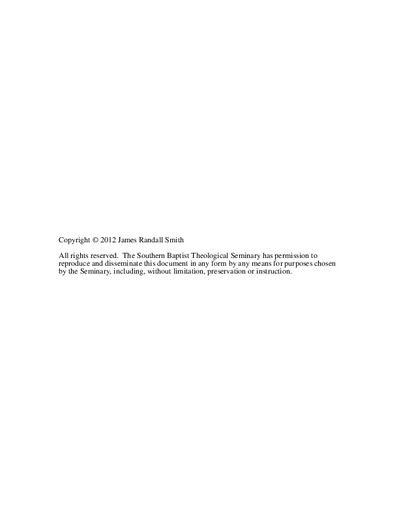An Evaluation of Contextualization and Application of Youth Ministry International's Training of Cuban Youth Workers
Subject
ContextualizationEducation
Missions
Training
Youth
Abstract
AN EVALUATION OF CONTEXTUALIZATION AND APPLICATION OF YOUTH MINISTRY INTERNATIONAL'S TRAINING OF CUBAN YOUTH WORKERS
James Randall Smith, D.Miss The Southern Baptist Theological Seminary, 2012 Chair: Dr. James D. Chancellor
This dissertation examines Youth Ministry International's (YMI) paradigm for training Cuban youth workers that sends credentialed expatriate professors into a limited access country, partners with a national seminary, and delivers a master's degree to qualified candidates, who upon completion of the program qualify as professors who then train students to be youth leaders in churches. The goal was to determine if the courses taught to national professors were contextualized to them, whether the national professors further contextualized the courses to students and if the graduating youth leaders successfully applied their training.
Chapter 1 introduces the ministry and strategy of YMI and its vision to assist churches, within people groups of the world, equip youth leaders with a Biblical and intercultural philosophy and strategy. In addition, the chapter outlines YMI's Cuban training program and goals.
Chapter 2 provides a review of literature addressing factors surrounding the project objectives: Cuban historical cultural background; definitions of contextualization; effective contextualization criteria; contextualization models; past and current attempts at Latin American contextualization and; examples of Cuban youth culture as ministry opportunities.
Chapter 3 explains the project's chosen methodology and how it was
implemented in Cuba. The chapter describes the research methods used to gather the data for the descriptive qualitative analysis used in search of an emerging grounded theory that addresses contextualization and application viability.
Chapter 4 summarizes the data findings from the research methodology applied to four categories of informants; 1st generation graduate/professors, 2nd generation graduates, pastors where the graduates serve and students and volunteer leaders in churches where the graduates serve. The chapter also includes data comparisons for a cross-case study analysis within the three seminary training regions.
Chapter 5 analyzes the data from the research and presents propositions that emerged from the grounded theory tradition of analysis. The chapter draws conclusions regarding the effectiveness of the training contextualization and application. A cross- case study analysis compares the data from the three seminary locations.
Chapter 6 concludes by reviewing the project's process, inherent limitations, final evaluations, proposed recommendations for further research and potential application to future missions training endeavors.

